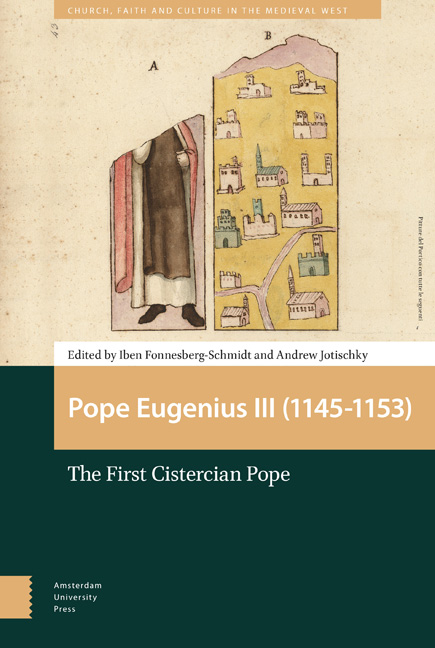Book contents
- Frontmatter
- Contents
- Preface
- Abbreviations
- Maps and Figures
- Introduction
- 1 ‘Justinian’s Laws, not the Lord’s’: Eugenius III and the Learned laws
- 2 Curial Politics and Papal Power : Eugenius III, the Curia, and Contemporary Theological Controversy
- 3 The Cistercians, Eugenius III, and the Disputed York Election
- 4 Eugenius III and the Crusades to the East
- 5 Eugenius III and the Northern Crusade
- 6 The Benefits of Exile
- 7 Eugenius III and France: the Protected Protector
- 8 A Golden Rose and the Deaf Asp that Stoppeth her Ears: Eugenius III and Spain
- 9 Eugenius III and the Roman Commune
- 10 Eugenius III Reclaims the Patrimony of St Peter
- 11 Eugenius III’s Privileges to Cistercian Houses
- 12 Eugenius III at Cîteaux, 1147
- 13 Eugenius III and the Church in the Crusader States
- Index
Preface
Published online by Cambridge University Press: 22 December 2020
- Frontmatter
- Contents
- Preface
- Abbreviations
- Maps and Figures
- Introduction
- 1 ‘Justinian’s Laws, not the Lord’s’: Eugenius III and the Learned laws
- 2 Curial Politics and Papal Power : Eugenius III, the Curia, and Contemporary Theological Controversy
- 3 The Cistercians, Eugenius III, and the Disputed York Election
- 4 Eugenius III and the Crusades to the East
- 5 Eugenius III and the Northern Crusade
- 6 The Benefits of Exile
- 7 Eugenius III and France: the Protected Protector
- 8 A Golden Rose and the Deaf Asp that Stoppeth her Ears: Eugenius III and Spain
- 9 Eugenius III and the Roman Commune
- 10 Eugenius III Reclaims the Patrimony of St Peter
- 11 Eugenius III’s Privileges to Cistercian Houses
- 12 Eugenius III at Cîteaux, 1147
- 13 Eugenius III and the Church in the Crusader States
- Index
Summary
Bernard of Pisa (c.1080s–1153) was one of the most surprising of medieval popes. A native of Pisa, he was a canon of the cathedral chapter and vicedominus of his archdiocese before entering Clairvaux as a monk in 1138, and becoming abbot of the new Cistercian foundation of Tre Fontane, near Rome, in 1140. He was elected to the papal throne in 1145 as a relative unknown at a time of crisis, and spent much of his pontificate away from Rome. As the first Cistercian monk to become pope, his relationship with his former abbot Bernard of Clairvaux has often been seen as the keynote of his pontificate, and Bernard's preaching of the Second Crusade has tended to overshadow Eugenius's role in the design and execution of that expedition. Yet his years as pope saw important developments in the relationship between the papal office and royal authority, in the role of the papacy as a judicial office, and in papal crusading theory. They were also critical years in the history of Rome, and of the Cistercian congregation.
The studies presented in this book consider the many facets of Eugenius as pope, exploring his oversight of judicial practice; theological developments in his pontificate; his treatment of Cistercian monasteries and of constitutional developments in his order; his relationships with Crown and Church in France and Spain, and with Rome and the Romans; his work in building up the papal states, and his view of the crusades in both the Baltic and the Mediterranean. Together these essays offer a new view not only of an under-appreciated pope but also of the institution he headed and of its place in a rapidly changing European society.
- Type
- Chapter
- Information
- Pope Eugenius III (1145–1153)The First Cistercian Pope, pp. 7 - 8Publisher: Amsterdam University PressPrint publication year: 2018

